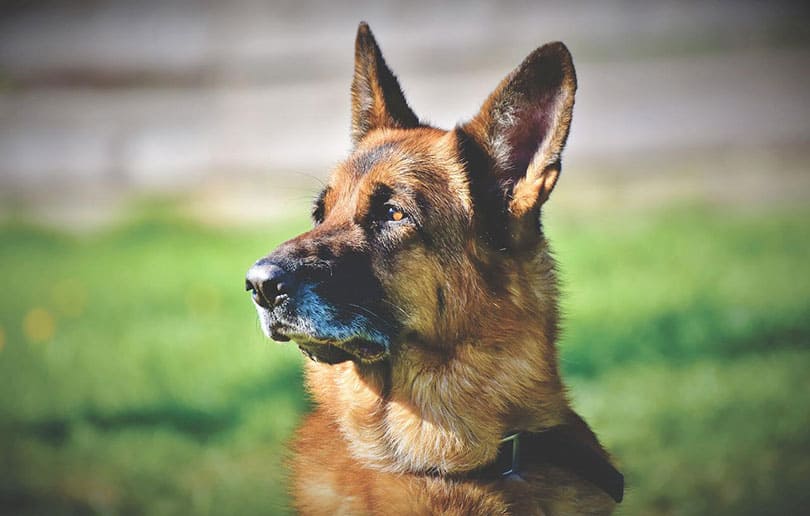Dogs are renowned for their acute sense of hearing. It makes them sensitive to even faraway noises, like thunder and fireworks—noises that you wouldn’t even bat an eyelid at. But how far can dogs actually hear on average?
In short, dogs can hear certain sounds 4–5 times further away than humans on average. In this post, we’ll explore dogs’ incredible sense of hearing.
A Dog’s Hearing Explained
Though it’s commonly believed that dogs hear everything better than humans can, this isn’t always the case according to Stanley Coren, Ph.D. In his book, How Dogs Think, he explains that dogs hear certain sounds significantly better than humans can, but there are some sounds for which a human’s and a dog’s hearing is pretty much identical.
A dog’s hearing all comes down to sound frequencies. For example, dogs are much better at detecting high-pitched sounds than humans are. To put this into perspective, humans cannot hear sounds at a higher frequency than 20,000 Hz (Hertz), whereas dogs can hear sounds with frequencies between 47,000 and 65,000 Hz.
Dogs can also hear sounds too quiet for humans to hear if they’re at a high frequency. As Stanley Cohen explains, they can hear soft sounds at between -5 dB and -15 dB—the negative symbol means that it’s below the intensity that humans can hear—and between 3,000 and 12,000 Hz.
Why Can Dogs Hear Better than Humans?
Dogs rely heavily on their senses of smell and hearing to survive in nature. Their noses give them information about new objects, places, and other animals, whereas their hearing helps them to detect and hunt down prey in the wild. Of course, domesticated dogs don’t need to hunt down their prey, but their natural instincts remain unchanged.
For example, wolves rely on small rodents as a food source. Small rodents like mice give off high-pitched sounds that humans cannot hear, but dogs and wolves can. So, the domestic dog’s ancestors were able to hear these sounds and this power ultimately contributed to their very survival.

Dogs and Noise Sensitivity
Due to their sound sensitivity, noises that don’t really bother us, like thunder, fireworks, or a balloon deflating can be incredibly stressful and even frightening to dogs. Some dogs may tremble, hide, or even pee themselves out of fear when they hear these noises. For that reason, it’s important to try and prepare as best as you can for firework night or when a storm is coming in.
Here are some tips for reducing your dog’s stress when these kinds of sounds are anticipated:
- Provide a space where your dog feels safe for them to go if they feel afraid. This could be their open crate or their bed. Draw the curtains and cover the crate to soundproof it a little. A blanket would be fine for this purpose.
- Play the sounds—like the sound of a thunderstorm—quietly in your home as background noise to help desensitize your dog to these noises. Do this in conjunction with a positive part of their day, like treat-giving time or playtime, so they learn to associate the sound with good times.
- Play with your dog when the sounds are happening. This is a good way to show them that everything’s normal and that there’s nothing to fear.
Final Thoughts
To sum up, dogs can hear sounds at much higher frequencies and at lower intensities than humans can. In the wild, dogs pick up high-pitched sounds given off by their prey, like small rodents, which helped them to survive. It is for this reason that dogs have such an acute sense of hearing. As a result, this is why your dog becomes stressed and frightened when they hear certain noises—they’re simply very sensitive to them.
Featured Image Credit: Pixabay














